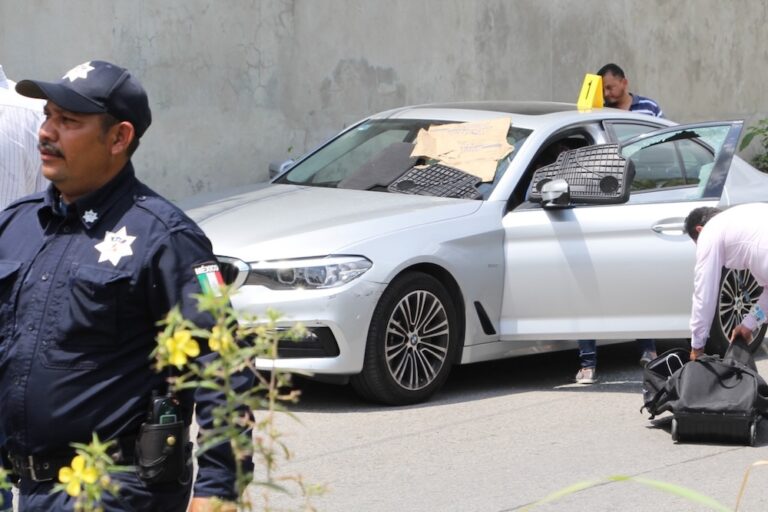(ARTICLE 19/CENCOS/IFEX) – On 24 February 2008, at about 2:00 p.m. (local time), Gabriel Huge Córdoba, a photojournalist for the NOTIVER news agency, was detained by the Federal Preventive Police (Policía Federal Preventiva, PFP) after covering an automobile accident involving PFP officers. Huge Córdoba was held for nearly four hours and subjected to physical violence […]
(ARTICLE 19/CENCOS/IFEX) – On 24 February 2008, at about 2:00 p.m. (local time), Gabriel Huge Córdoba, a photojournalist for the NOTIVER news agency, was detained by the Federal Preventive Police (Policía Federal Preventiva, PFP) after covering an automobile accident involving PFP officers. Huge Córdoba was held for nearly four hours and subjected to physical violence as well as psychological pressure. He was accused of having abused the authorities. The incident took place in the state of Veracruz, which is located on the Gulf of Mexico. At the time of the incident, Huge Córdoba was covering an accident between a car and a PFP vehicle transporting individuals accused of murder.
He has also been charged with “abusing the authorities”, in connection with the same incident.
Huge Córdoba was detained when he attempted to defend his colleague, Franco Cardel of the Grupo FM radio network, who was being assaulted by PFP agents after they identified Cardel as a participant in a similar altercation that had taken place several weeks prior. According to information obtained by ARTICLE 19 and CENCOS, Huge Córdoba underwent nearly four hours of psychological pressure. The objective of Huge Córdoba’s detention appears to have been to send a warning to other journalists. Huge Córdoba said, “The PFP commander told me, ‘You’re lucky, right now you feel pain, but next time you won’t feel anything. There will be no return.'”
Huge Córdoba was taken in squad car Number 10772 to the PFP operations base in Las Bajadas and was later transferred to the Veracruz-Boca del Río Intermunicipal police regional headquarters. After 6:00 p.m., he was sent to an office of the Public Ministry (Agencia Tercera del Ministerio Público) in charge of civil offences to answer charges of “abusing the authorities”.
Both Huge Córdoba’s illegal detention and the altercation between journalists and PFP officers several weeks prior took place within the context of the “Veracruz Seguro” safety operations being carried out by federal security forces and the army in conjunction with state authorities. These operations have been initiated in various states by President Felipe Calderón Hinijosa in order to combat organized crime. However, a number of civil society organizations, both national and international, as well as the National Human Rights Commission (Comisión Nacional de Derechos Humanos), have denounced human rights violations that have taken place during the implementation of the programme, against not only journalists but also other citizens.
The list of cases of illegal detentions and other acts of aggression against journalists that have taken place during the public safety operations conducted by the army and other federal security forces has been increasing at an alarming rate. According to the Committee to Protect Journalists (CPJ), on 7 August 2007, Manolo Acosta and Sinhué Samaniego Osoria, of “Zócalo” daily newspaper, Jesús Meza Gonzáles, of the “La Voz de Coahuila” newspaper, and Alberto Rodríguez Reyes, of Canal 4 television station, were detained, beaten and interrogated by army personnel while they were trying to carry out their work (see IFEX alerts of 19 September and 13 and 10 August 2007). In a similar incident, on 20 February 2008, the national Attorney General’s Office decided to end an investigation into the illegal detention of reporter José Manuel Prieto Marcial, of “Primera Hora” newspaper in Culiacán, Sinaloa (see the alert of 20 February 2008). In both cases, the illegal detentions and other human rights violations have gone unpunished.
Recently, a worldwide increase in restrictions on attempts to restrict freedom of expression has been noted with great concern. These activities have been justified on the basis of national security concerns and the need to combat organized crime. Interpretations of ambiguous legislation and the discretionary application of regulations have led to these restrictions and opened the way for a diversity of abuses.
There has been a multiplication around the world of restrictions on freedom of expression, on the pretext of the imperatives of protecting national security or combating organised crime. ARTICLE 19 and CENCOS call on the Mexican state to respect the Johannesburg Principles on National Security, Freedom of Expression and Access to Information. This document outlines a series of principles with respect to the type and duration of restrictions that can be imposed on freedom of expression and access to information in the name of national security.
We also respectfully call upon the Mexican state to, in accordance with international human rights agreements, implement the necessary measures to ensure that freedom of expression is fully respected within the context of public security.


